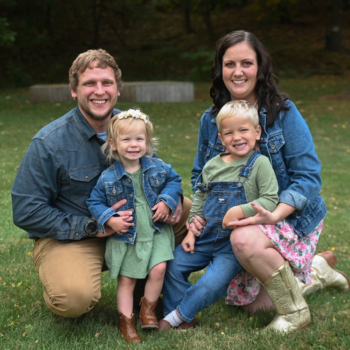
The Devastation (and Hope) of Preeclampsia: One Mother's Story
June 21, 2011

Written April 2002:
On March 23, 1998, the EMTs from the ambulance wheeled me into one of the labor & delivery rooms and were preparing to transfer me to the bed when the waiting perinatalogist on call snapped at them to leave me alone: "We don't have time for that!" The ultrasound machine was waiting and the doctor checked my pregnant belly, and then looked at my husband and me, "I'm sorry," he said. "It's too late."
In confusion, desperation and amidst the spreading fog of semi-consciousness, I begged him, "Can't you do an emergency c-section and save the baby? Can't you do something? There must be some mistake!" I was a day shy of 29 weeks pregnant and the baby's heart had still been beating when we left the other hospital not 15 minutes earlier. We came to the hospital that morning because I was feeling strange, not because my baby might DIE!! That's not supposed to happen! I felt the fog thickening around me.
My husband and I held each other and cried quietly, still not fully understanding. "This must be God's will," he offered. That statement would later take me on a life-changing spiritual journey, but for now, I was deeply saddened and completely bewildered. What went wrong? When and why did a perfectly normal pregnancy go downhill so apparently fast?
Five days earlier I had called my OB's office, complaining of severe and rather sudden swelling in my feet. I was 28 weeks into my first pregnancy. "Put your feet up and drink more water," suggested the nurse. For the next 3 days, the edema persisted with only partial subsiding when I propped up my feet for long stretches. "Drink more water," was the only advice offered by the doctor's office. I was up to over 2 quarts a day. How much more could I drink? (As an aside, my last prenatal visit was over 3 weeks earlier and my BP was 102/60 typical for me but my proteinuria had not been measured on that particular visit, an oversight.)
By the time I hit the weekend, I had a headache and just wasn't feeling right. I lay down as often as I could, but we had to finish the baby's room and spent some of the weekend shopping for furniture. Sunday afternoon, my husband and I went to the gym, thinking that a little bit of exercise would do me well. Not five minutes into it, I looked down at my hands and they were bright red. I asked the staff to take my blood pressure. 140/90. I rested and we retook it 5 minutes later. Still 140/90. This from somebody who's blood pressure hovers around 100/55.
I immediately went home to lie down, only to face a fitful, sleepless night.
Around 4 AM, I finally called the hospital's Labor & Delivery nurse's station to report frequent urination, cramping, sleeplessness and what turned out to be pre-term contractions. Within an hour, I was at the hospital and immediately things went from bad to worse. Upon admission, my blood pressure was 140/100, proteinuria 3+, uric acid 6.7, I had blurry vision, a headache, upper abdominal pain, nausea and vomiting; the baby's heart rate hovered at 90 bpm. I had full-blown preeclampsia, but the doctors failed to recognize it.
My OB still hadn't seen me personally, but called in a request for an ultrasound. After being wheeled to the radiology department, we were left alone for over two hours after the technician conducted the biophysical profile. Even to our untrained eyes, the baby was clearly in severe distress. The one busy radiologist finally reviewed the results: the baby had failed 3 out of 4 tests -- and concluded there were problems. They still didn't detect the large blood clot that would have indicated a placental abruption.
It took until 1 PM to be transferred (8 hours had elapsed since my admittance) to a hospital that had the facilities to care for a 29 week preemie and a very sick mom.
As the afternoon and evening progressed, my own vital signs continued to degrade: my liver was failing, my blood was thinning increasing the risk of hemorrhaging, and my blood pressure got as high as 190/110 increasing my risk of seizure. I was put on magnesium sulfate to ward off possible seizures and pitocin drip to speed up labor so I could deliver my stillborn baby. The fog -- both physiological and emotional -- that began enveloping me that morning now subsumed me.
As the clock struck midnight, the resident on-call ruptured my uterine membranes. Within 20 minutes I delivered our two-pound, three-ounce baby daughter. (A later autopsy confirmed that she was an otherwise completely healthy little girl, though she was small for her gestational age). It was only then that I finally knew what I had refused to believe for 11 hours. My baby was dead. It was March 24, 1998: 11 weeks before the blessed event was expected.
It also wasn't until then that the full impact of my own declining health became apparent. A huge gush of blood followed the baby's delivery. I assumed this was normal. I had no idea that delivering literally half of your body's blood supply with your baby was not normal. Ironically, the partially-abrupted placenta would not completely detach itself to be delivered as afterbirth, so I had an emergency D&C. I wanted so much to keep holding my daughter while she was still warm, but instead my husband carried her, swaddled in the tiniest blanket, and stood outside the OR, peering through the small window at the scene on the operating table, praying he would not lose me, too. I remember tapping my pinkie finger throughout the procedure (until I lost consciousness) to the beat of the EKG machine. "If I keep the rhythm going, I won't die," I thought.
In the hours and days that followed, I lost liver function, my kidneys shut down, I ballooned up like a Macy's Day Parade float, and did everything I could to avoid the recommended blood transfusion. The doctors suggested it was ridiculous for me NOT to get blood; all I could think about were the odds of contracting another "low probability/high risk" disease. My hematocrit was 18. Most people pass out. I was hobbling to the bathroom. Later, I couldn't remember why I was so determined to be strong since I really wanted to die and go to heaven with my little girl.
I checked out of the hospital Thursday afternoon, March 26. Friday morning we buried our daughter. A freezing rain did not stop over 200 mourners from celebrating Nikonia Evangelia's life. As my wheelchair was pushed over the mud to the grave site of my firstborn, I realized that nothing in my life would ever, ever be as tormented and heartbreaking as burying my child. If there was anything magical and innocent left, it was gone.
Update:
My next pregnancy was co-managed by a superb perinatologist and me. I count myself part of the team, because I realized that my ignorance and a health care system that didn't respect the devastating power of preeclampsia are largely to blame for my daughter's death. In August 1999, our son, Jordan, was born early and small, and spent almost two weeks in the Neonatal Intensive Care Unit, but he and I survived this second bout of preeclampsia, which can occur in subsequent pregnancies, contrary to medical myth. Today, Jordan is a healthy, highly energetic and happy toddler. At night, when I hold him in my arms before putting him down to sleep, he rests his little head on my shoulder, clutches my neck with his hand, and sometimes looks up and gives me a spontaneous kiss. And for a moment, there is magic and innocence in my life again.
And finally -- and I do mean finally! -- with Jonathan (our newborn as of this writing in April 2002), I was virtually asymptomatic when we delivered him at 39 weeks. Early in this pregnancy, my abnormally high cardiac output suggested that I was destined for preeclampsia a third time, so we started a regimen of anti-hypertension medication. I credit the preventative use of Atenolol and extremely close monitoring of mother and baby with this successful outcome.
Before Nikonia, I had never heard of preeclampsia, either by medical care providers or experienced friends. That needs to change. In ignorance, preeclampsia can be deadly. We shouldn't have to sacrifice our babies and/or their mothers to gain wisdom.
Eleni Z. Tsigas
Portland, Oregon

I am a two-time survivor of postpartum preeclampsia. I am also a Licensed Professional Counselor and specialize in treating trauma in youth during...
ReadMore- For My Daughter: Our Birth Story February 09, 2026
- Leo the Lion February 09, 2026
- Pre-Eclampsia Still Haunts Me To This Day February 09, 2026
- Trust Your Gut January 17, 2026
- My Baby Saved Both Of Our Lives (my Preeclampsia and Postpartum Preeclampsia Story) January 09, 2026
- I Thought I Was Dying… and I Was December 30, 2025
- Trust Your Gut, Mama: Our Preeclampsia Journey December 08, 2025
- Grief and Gratitude can Coexist November 25, 2025
- Listening To My Body Saved My Life November 24, 2025
- Almost Didn’t Make It November 24, 2025
